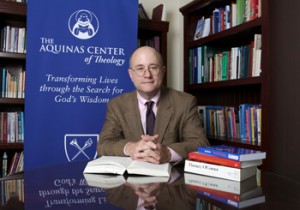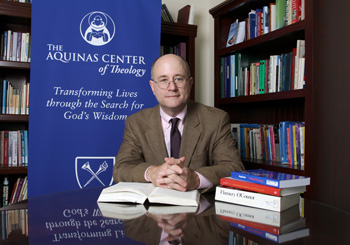
Dr. Phillip Thompson
Integrated Catholic Life™ recently had the pleasure of sponsoring a talk by Dr. Phillip Thompson, Executive Director of the Aquinas Center of Theology at Emory University in Atlanta, GA. Dr. Thompson spoke on the subject of Catholic Leadership which is certainly a relevant topic in today’s world. The event was well attended and the enthusiastic dialogue and vibrant table discussion after his talk spoke to the high level of interest in this subject.
Dr. Thompson is an engaging speaker and he did a wonderful job of integrating Church teaching into practical application on the subject of Catholic Leadership for those attending.
Listen to Dr. Thompson’s presentation and Q&A…
Outline of Dr. Thompson’s presentation:
“The hope of the Church is that Christian business leaders will, despite the present darkness, restore trust, inspire hope, and keep burning the light of faith that fuels our daily pursuit of the good” (Cardinal Turkson, President of the Pontifical Council of Peace and Justice, 2012).
I. Leadership Definitions
What is Leadership? Traditional Leadership is defined as a “process whereby an individual effectively influences a group of individuals to achieve a common goal” (Northouse, Leadership Theory and Practice, 4th Edition).
II. Levels of Leadership
Level 1 – Knowledge skills: substantive knowledge, technical skills, analytical skills
Level 2 – Leadership skills: communication, teamwork, assessment, vision, global skills, diversity, motivation
Level 3 – Organizational skills: framing the issues… structural, political, human resource, visionary
Level 4 – Ethical leadership: critical thinking approach-obligations, values, consequences
Level 5 – Catholic leadership must be aligned with these principles:
- Solidarity
- Family
- Dignity of human life
- Option for the poor
- Dignity of work and rights of workers
- Care for God’s creation
Catholic Leadership Definition: Leadership is a process whereby an individual effectively and ethically influences a group of individuals to achieve a common worthwhile goal. This leadership process must be guided by and consistent with Catholic principles.
III. Can We Be “Catholic Leaders”?
Challenges and resources lead to self-assessment:
- Are my actions promoting the inherent dignity of all persons?
- Is justice or right relationship part of my decision making process?
- Am I balancing my family and work life?
- What about those who are poor or vulnerable?
- Have I given appropriate attention to my faith development?
IV. Closing Thoughts
“God has created me for some definite service; I have my mission… I am a link in a chain, a bond of connection between persons. He has not created me for nothing” (Cardinal John Henry Newman).
“Christian Revelation is the true lodestar of men and women as they strive to make their way amid the pressures of a material habit of mind and the constrictions of a technocratic logic. It is the ultimate possibility offered by God for the human being to know in all its fullness the seminal plan of love which began with creation…
“Here the words of the Book of Deuteronomy are pertinent: “This commandment which I command you is not too hard for you, neither is it far off. It is not in heaven that you should say, ‘Who will go up for us to heaven, and bring it to us, that we may hear it and do it?’ Neither is it beyond the sea, that you should say, ‘Who will go over the sea for us, and bring it to us, that we may hear and do it?’ But the word is very near you; it is in your mouth and in your heart, that you can do it” (Pope John Paul II, Fides et ratio).
V. Useful Resources
Pontifical Council for Justice and Peace, “Vocation of the Business Leader: A Reflection” (2012) – http://www.pcgp.it/dati/2012-05/04-999999/Vocation%20ENG2.pdf
Jeffrey Cornwell and Michael Naughton, Bringing Your Business to Life, The Four Virtues That Will Help You Build a Better Business and a Better Life (Regal 2008)
Randy Hain, The Catholic Briefcase: Tools for Integrating Faith and Work (Liguori 2011)
Chris Lowney, Heroic Leadership (Ignatius 2003)
View the excellent video of Dr. Michael Naughton: “Beyond a Career: The Vocation of Catholic Business Leaders” from the Atlanta Catholic Business Conference on the Aquinas Center website – http://www.aquinas.emory.edu/ – click the YouTube link.
VI. Catholic Social Teaching
The Church’s social teaching is a rich treasure of wisdom about building a just society and living lives of holiness amidst the challenges of modern society. Modern Catholic social teaching has been articulated through a tradition of papal, conciliar, and episcopal documents. The following is one expression of the Themes of Catholic Social Thought:
- Solidarity . We are one human family whatever our national, racial, economic, etc. and differences. We are our brothers’ and sisters’ keepers. At the core of the virtue of solidarity is the pursuit of justice and peace.
- Call to Family, Community, and Participation. The person is sacred and social. How we organize our society in economics and politics, directly affects human dignity and the capacity of individuals to grow in community. Marriage and the family are the central social institutions that must be supported and strengthened.
- Dignity of Human Life. The Catholic Church proclaims that human life is sacred and the measure of every institution is whether it threatens or enhances the life and dignity of the human person from conception to death. This belief is the foundation of all the principles of our social teaching.
- Option for the Poor and Vulnerable. A basic moral test is how our most vulnerable members are faring. Our tradition instructs us to put the needs of the poor and vulnerable first.
- The Dignity of Work and the Rights of Workers. The economy must serve people, not the other way around. Work is both a way to make a living and a form of continuing participation in God’s creation. The basic rights of workers must be respected–productive work, decent and fair wages, to private property, and to economic initiative.
- Care for God’s Creation. We are stewards of creation. We are called to protect people and the planet, living our faith in relationship with all of God’s creation.
We hope you find this information to be helpful and enjoy listening to the wonderful talk by Dr. Thompson.
Speaker Bio: Dr. Phillip M. Thompson has been the Executive Director of the Aquinas Center of Theology at Emory University for the past four years. Prior to this appointment he directed the Leadership Certificate Program in the School of Public Policy at the Georgia Institute of Technology from 2005-2008. From 1999-2005, he was the Patricia A. Hayes Professor of Ethics and the Director of the Center for Ethics and Leadership at St. Edward’s University in Austin, Texas.
He has a Ph.D. in the History of Culture from the University of Chicago, a J.D. from the University of Georgia, and an LL.M. in Health Law from DePaul University. He has published a book, Between Science and Religion, The Engagement of Catholic intellectuals with Science and Technology and has a forthcoming book titled Returning to Reality: Thomas Merton’s Wisdom for a Technological World. He has published over thirty articles and lectured broadly in the fields of leadership, religion and science, Catholic social thought, and professional ethics.
Dr. Thompson spoke at a meeting of Faith@Work, a ministry outreach educational program of the Integrated Catholic Life™.
Please help us in our mission to assist readers to integrate their Catholic faith, family and work. Tell your family and friends about this article using both the Share and Recommend buttons below and via email. We value your comments and encourage you to leave your thoughts below. Thank you! – The Editors













